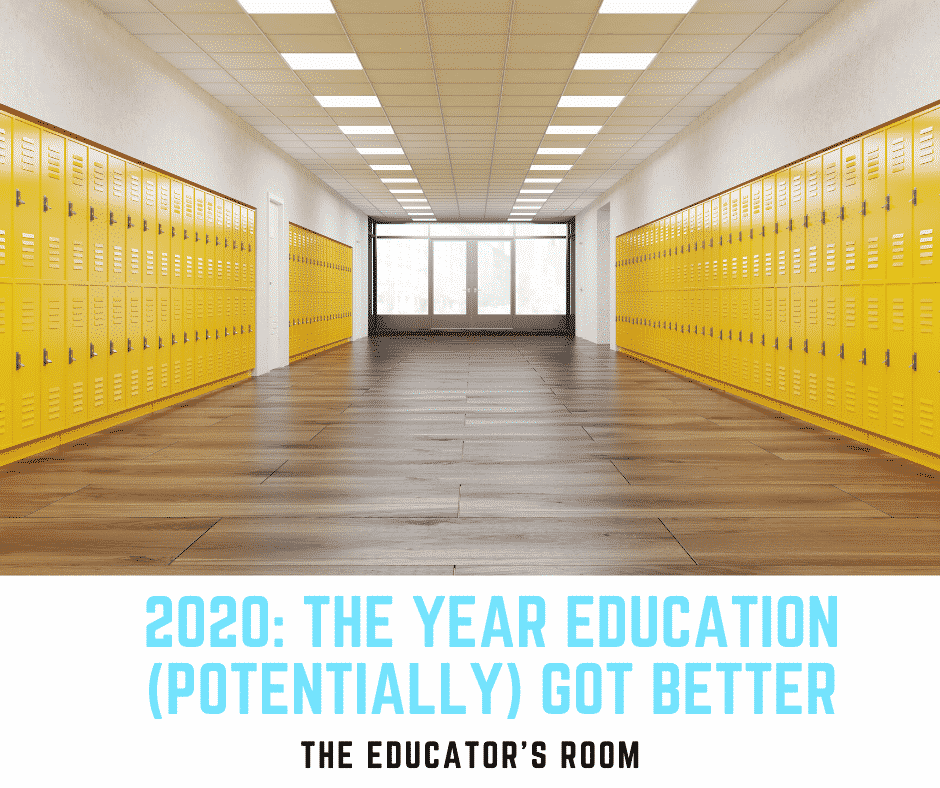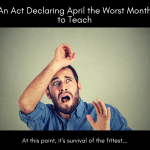Guest Writer: Rachel Harvey
Recently, I’ve seen a lot of TikTok videos that paint the year 2020 as a sort of apocalypse. Picture this: years from now, when people mention those four digits in tandem, they’ll recall a montage of bad memories set to the sounds of melodramatic shuffle music. The word “moistly” will be cringeworthy in an even greater way than it was before (at least, in Canada it will). People will laugh but secretly panic a little inside at the mention of toilet paper. Sourdough bread will be a sour reminder of quarantining at home. I could go on with a never-ending list of newly existing pop-culture clichés, but you get the idea: even if we look back on this moment through a tongue-in-cheek lens, it will not be remembered as a good year for most people.
(Disclaimer: I use humor here as a coping mechanism in the current situation; I do not intend to belittle in any way the tragedies that many people have suffered due to the Coronavirus.)
I am writing this article to state firmly and controversially that I do, however, think 2020 will be remembered as a fabulous year for teachers.
Granted, we are only at the start of May, and I really have no idea how this whole pandemic is going to play out. I can only spew conjecture as to what my life as an educator will be like in one month, four months, a year from now. And so, of course, that is what I will do, because if anything this job has taught me to be comfortable with flying by the seat of my pants.
To start, I don’t envision that there will be a return to “school as we knew it” after the urgency of this pandemic has subsided. After governments and school boards all agreed – on pretty much a global scale – to shut down schools until this virus is under control, I doubt an over-eager return to business, as usual, will suffice. First of all, because the virus is still alive, and multiplying. Secondly, we do not have a vaccine yet. I don’t think I need to state any more reasons why schools will not return to normal. With many sources claiming that we are over a year away from a viable vaccine, we cannot reasonably expect educators to put themselves in the full line of fire (i.e.duty) as soon as people get sick of sitting around at home (distasteful pun hesitatingly intended). I am aware that childcare is a serious issue, as well as the negative socio-economics of school shutdowns – we will need things to get back to a type of normal, for sure. However, the fact remains, things will look different when we return to school, out of necessity.
The question is, how?
[bctt tweet=”It doesn’t take an expert to recognize that packing kids into a room like sardines in a tin can for hours at a time is unsanitary.” username=””]
A big change I foresee, and one that I am honestly jumping for joy at the thought of, is smaller class sizes upon return. It doesn’t take an expert to recognize that packing kids into a room like sardines in a tin can for hours at a time is unsanitary. A quote from an article published by NPR recently really caught my fancy: “The doctors say 39 sweaty bodies in a classroom is not healthy and safe – by the way, it never was.”
As a teacher with large class sizes, I had at least three bad colds this year, and a recurring case of strep throat complemented by an undiagnosed rash the previous year. In 2020, teachers have been striking for smaller class sizes because we’ve known all along that this is an issue. In addition, the fact that with large class sizes, a full-time teacher has to mark 30+ assignments for each class regularly (and usually on their own time), has to plan accommodations and/or modifications for many of these students and has to police the disruptive masses during the last period of the day- after they just finished gym class. Teaching has a high burnout rate, in my opinion, due to extensive class sizes alone. Just when teachers couldn’t crowd control any longer, ‘manna from heaven’ arrived-a novel virus, that will literally enforce smaller class sizes for public health reasons. I say hallelujah to this particular development and am excited to see how this can change teachers’ and students’ day-to-day lives for the better.
In addition to class sizes decreasing, I hope to see a more manageable workload for teachers. In the teaching profession, it is often understood that the more you give, the more of a hero you are. For example, if you volunteer to spend your entire weekend supervising kids at a volleyball tournament, or you stay up until 2 am marking tests to meet a 24-hour turn-around time, you’re a hero. This kind of self-sacrifice is seen as a rite of passage, applauded.
However, what people often don’t say is-this “heroic” ethos and related behavior is self-destructive and you need to stop! The old (as in, two months ago) education system was designed for teachers to fail at having a work/life balance. During the day, the expectation for a teacher was that they must police large groups of children while also meeting extensive curricular objectives, with a focus on delivering differentiated lessons that account for each individual student’s (often complex) learning needs. Teachers had to do this with a smile on their faces, even though they often didn’t get a bathroom break.
I am here to proclaim that holding your pee all day does not guarantee sainthood. If that wasn’t enough, during the evenings after the students went home, teachers were expected to complete their paperwork even through the weekend. This pandemic has ushered in something that many of us teachers haven’t had in a long time-a break in our relentless schedules.
This means the freedom to use the restroom, to wake up after 5 a.m. (for those without young children), to drink a morning tea in peace, to feel like we might – just might – be able to handle all of the planning and marking for that day without taking it home that night because we’re spending a lot less time policing. The freedom – to be human and a teacher!
Can I get an amen? In the rosiest of futures, I envision there will be a blend of small class learning in schools and online learning. And perhaps teachers won’t be expected to do both; some could play to their strengths and focus on in-person classes, while others could specialize in online learning delivery. Or, half of a teacher’s day could be spent working with students in-person, the other half online (with built-in prep time each day). The need for constant policing would be reduced, the learning would be qualitatively increased, and bathroom breaks would still be possible.
Amen.
The last rallying point in my vision for a changed education system is threefold. When we do return to in-person learning, a teacher’s life will be improved just by the sheer increase in personal hygiene across the board. Mask-wearing could be a thing in the foreseeable future; hand washing might become regularly enforced- a message of hope- particularly for elementary teachers!
Adopting a blended synchronous/asynchronous approach to teaching and learning will provide a whole new level of flexibility for teachers and students. Teachers will hopefully have staggered or adjusted daily schedules, where they won’t be expected to do all their teaching live. This could ideally provide them with more working time to plan lessons-depending on their administration, of course. Plus, teachers could avoid those inevitable days when they are just “winging it” because they’re bound to an overwhelming schedule and are not provided enough time to plan.
Message to non-teachers: Many teachers, especially new teachers, are improvising daily because they aren’t given enough working time to prepare quality lessons and are shattered by the time they get home. This creates long, frustrating days for everyone. For example, You wake up to an alarm at 5 am, only to have the daily panic set in knowing you have to do presentations for 8 hours and I have nothing prepared! With adopting asynchronicity in education, students can finally have the option to complete lessons online at a time they work best at! Nine in the morning is generally a terrible time for asking high school students to find an example of personification in Hamlet. This new form of learning provides more opportunities to meet students where they are at, when they are at their best.
The last – and possibly most important point – is that during and after this pandemic, many students will have increased opportunities to develop the internet-based skills they need to be successful in 2020 and beyond. Let’s face it, in many classrooms around the world, students are not currently being taught the technology skills they need for the future (for a variety of reasons, including ineffective funding allocation to outdated curriculum). Hopefully now, there will be a more urgent push to address these issues on macro and micro levels. Yes, there are MAJOR issues that will need to be addressed in the future regarding students’ access to technology (Think about the clear digital divide.)
But ultimately, kids are not receiving a useful education if they are not being exposed regularly to online learning and technologies. In my opinion, digital literacy is the new literacy. So, teachers, it’s time to put away any protectionist stances you might harbor against online learning: this is the new, virtually enhanced reality. Hop on this train, or it’ll leave without you.
In closing, I envision the teaching world to change drastically as a result of this pandemic – and I am doing a dance of joy because of it! This profession is WAY more difficult than it needs to be, and WAY more ineffective than it should be. This present situation has forced us to propel our teaching and learning into the modern-day. New forms of learning — particularly online — are the future. To deny this, and to think that school will just “go back to normal once this thing is over” is to deny the fact that we have been given a righteous opportunity to change what hasn’t been working and to “hit the reset button”, as a superintendent, I once knew used to say during crisis situations.
As teachers, we shouldn’t want things to return to normal. We should use this time as a true catalyst for change. Because I have a dream to be a teacher in a world where a work/life balance is celebrated. Where I can reimagine and adjust my lesson delivery in ways that will stick with the kids. Where I can plan thoughtful, interactive lessons every week that will ignite or reignite students’ passions for learning! Where I can actually realize these dreams, rather than just idealize them. Because let’s face it: our pre-pandemic education system was not really effective in 2020. Teachers, the time to reinvent yourselves, and our profession is now. The question is how are you preparing for this next adventure?






